

How plastic food containers could be making you fat, infertile and sick. [UPDATE: Recent research has been published that casts doubt on the hypothesis that BPA is estrogenic in humans.
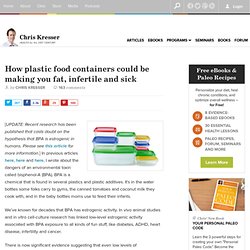
Please see this article for more information.] In previous articles here, here and here, I wrote about the dangers of an environmental toxin called bisphenol-A (BPA). BPA is a chemical that is found in several plastics and plastic additives. It’s in the water bottles some folks carry to gyms, the canned tomatoes and coconut milk they cook with, and in the baby bottles moms use to feed their infants. How to prevent colds and flus naturally. Since cold and flu season is now upon us (at least in the U.S.), I figured I’d take the opportunity to share my favorite tips for natural prevention and treatment.
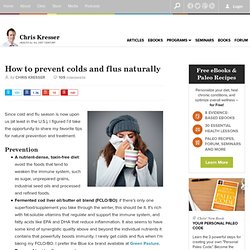
Prevention A nutrient-dense, toxin-free diet: avoid the foods that tend to weaken the immune system, such as sugar, unprepared grains, industrial seed oils and processed and refined foods.Fermented cod liver oil/butter oil blend (FCLO/BO): if there’s only one superfood/supplement you take through the winter, this should be it. It’s rich with fat-soluble vitamins that regulate and support the immune system, and fatty acids like EPA and DHA that reduce inflammation. It also seems to have some kind of synergistic quality above and beyond the individual nutrients it contains that powerfully boosts immunity. I rarely get colds and flus when I’m taking my FCLO/BO. Selenium: The Missing Link for Treating Hypothyroidism? This article is part of a special report on Thyroid Disorders.
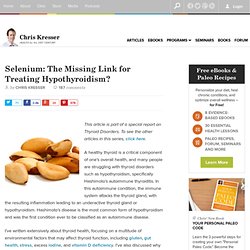
To see the other articles in this series, click here. A healthy thyroid is a critical component of one’s overall health, and many people are struggling with thyroid disorders such as hypothyroidism, specifically Hashimoto’s autoimmune thyroiditis. In this autoimmune condition, the immune system attacks the thyroid gland, with the resulting inflammation leading to an underactive thyroid gland or hypothyroidism.
Is your daily shower making you sick? The quality of our drinking water is a major determinant of our health and wellbeing.
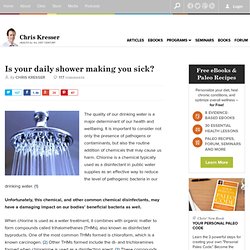
It is important to consider not only the presence of pathogens or contaminants, but also the routine addition of chemicals that may cause us harm. Chlorine is a chemical typically used as a disinfectant in public water supplies as an effective way to reduce the level of pathogenic bacteria in our drinking water. (1) Unfortunately, this chemical, and other common chemical disinfectants, may have a damaging impact on our bodies’ beneficial bacteria as well. When chlorine is used as a water treatment, it combines with organic matter to form compounds called trihalomethanes (THMs), also known as disinfectant byproducts. One of the most common THMs formed is chloroform, which is a known carcinogen. (2) Other THMs formed include the di- and trichloramines formed when chloramine is used as a disinfecting agent. (3) These compounds are toxic when consumed, inhaled, or applied to the skin. The high price of antibiotic use: Can our guts ever fully recover?
RHR: The Placebo Effect and The Power of Belief in Healing. The placebo effect defies the mainstream medical understanding of the relationship between mind and body and its role in health and disease.
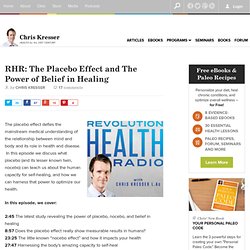
The little known difference between folate and folic acid. Dirt: A Paleo superfood? Over the past few decades, chronic inflammatory disorders such as inflammatory bowel disease (IBD), allergies, and asthma have become significantly more common in industrialized countries.
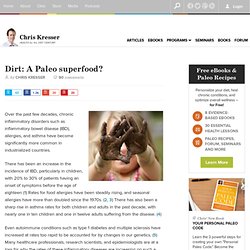
Best Your Stress Month: 3 Tips for Working With Stress. Just a quick note to check in and see how you’ve all done with the first two weeks of the Best Your Stress challenge.

Have you been able to stick with the commitments you’ve made? What have you noticed so far? Most people have more trouble sticking with stress management programs than they do making dietary changes or following a supplement regime. Adopting a new diet or taking some pills does involve changes in behavior, but it doesn’t challenge our concept of who we are in the world in the same way that committing to a stress management program can. For example, if you have a belief that your self-worth is directly tied to the amount you get accomplished during a day, you will probably find it very difficult to set time aside for rest and relaxation.
Shaking up the Salt Myth: The Human Need for Salt. In the first part of my series on salt, I discussed the historical significance of salt and its role in the evolution of humanity.
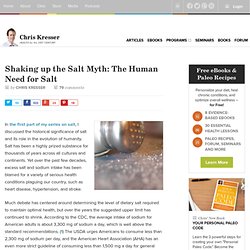
Salt has been a highly prized substance for thousands of years across all cultures and continents. Yet over the past few decades, excess salt and sodium intake has been blamed for a variety of serious health conditions plaguing our country, such as heart disease, hypertension, and stroke. Much debate has centered around determining the level of dietary salt required to maintain optimal health, but over the years the suggested upper limit has continued to shrink. Why local trumps organic for nutrient content.
I’m sure by now many of you have heard about the Stanford study claiming that organic foods are no healthier or safer than conventional alternatives.
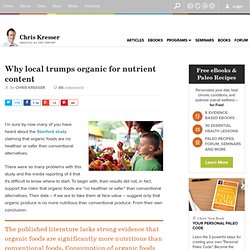
There were so many problems with this study and the media reporting of it that it’s difficult to know where to start. To begin with, their results did not, in fact, support the claim that organic foods are “no healthier or safer” than conventional alternatives. Their data – if we are to take them at face value – suggest only that organic produce is no more nutritious than conventional produce. From their own conclusion: The published literature lacks strong evidence that organic foods are significantly more nutritious than conventional foods. According to the authors, organic foods are no more nutritious than conventional foods.
The Best (and Worst) Cookware Materials. With the wide range of cookware available on the market today, it is easy to see why consumers may be confused about which materials to look for.
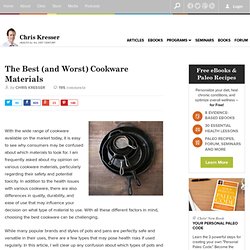
I am frequently asked about my opinion on various cookware materials, particularly regarding their safety and potential toxicity. In addition to the health issues with various cookware, there are also differences in quality, durability, and ease of use that may influence your decision on what type of material to use. Shaking up the Salt Myth: The Dangers of Salt Restriction.
“In an era when dietary advice is dispensed freely by virtually everyone from public health officials to personal trainers, well-meaning relatives, and strangers on check-out lines, one recommendation has rung through three decades with the indisputable force of gospel: Eat less salt and you will lower your blood pressure and live a longer, healthier life.” Gary Taubes, 1998 In my last two articles, I discussed the history of salt in the human diet and the physiological need for salt. Many proponents of the Paleo diet suggest limiting salt based on evidence of low salt intake during the Paleolithic era. This limitation meshes with recommendations made by various health organizations, such as the USDA and the American Heart Association, who suggest limiting sodium to at least 2,300 mg per day and even as little as 1,500 mg per day. (1, 2) And if our Paleolithic ancestors ate a low salt diet, then it certainly must be healthy, right? Hydration 101: How Much Water Do You Really Need?
Eight ounce glasses of water, eight times per day: this has been the water drinking mantra pushed by health professionals, beverage companies, and popular media for decades. From the number of people sipping on water bottles on a constant basis, it seems like the “drink more water” message is getting through.
But is this message accurate? And where did it come from? It may surprise you to learn that there has never been any scientific evidence to support the “eight by eight” doctrine when it comes to proper hydration. The first recorded scientific endorsement of a water intake recommendation appeared as a brief footnote in 1945, when the Food and Nutrition Board of the National Academy of Sciences published its Dietary Guidelines. (1) And like many other nutrition recommendations, it appears that individual needs for water vary widely, and 64 ounces of pure water every day may actually be too much for some people. (2) So how do you determine how much water you need as an individual?
Got digestive problems? Take it easy on the veggies. A couple weeks ago I wrote an article called FODMAPS: Could Common Foods Be Harming Your Digestive Health? I described how certain classes of foods, known as FODMAPs, are poorly digested in certain people and can lead to gas, bloating, pain and changes in stool frequency and consistency. Studies have shown that conditions like Irritable Bowel Syndrome (IBS) are associated with FODMAP intolerance, and that a low-FODMAP diet offers relief in a substantial percentage of people with IBS.
Today I’ve got another tip for those of you with digestive issues, including IBS, constipation, diarrhea and acid reflux: eat fewer vegetables. Yep, that’s right. Nutrition for Healthy Skin: Vitamin E, Pantothenic Acid, and Selenium. In this series, we’ve covered a wide range of vitamins and minerals that are important for skin health. Part 1 discussed how vitamin A improves the rate of skin turnover, zinc aids in wound healing, and vitamin C promotes collagen growth. Part 2 explained how omega-3 fatty acids reduce inflammation, biotin improves skin moisture, and sulfur has anti-aging qualities.